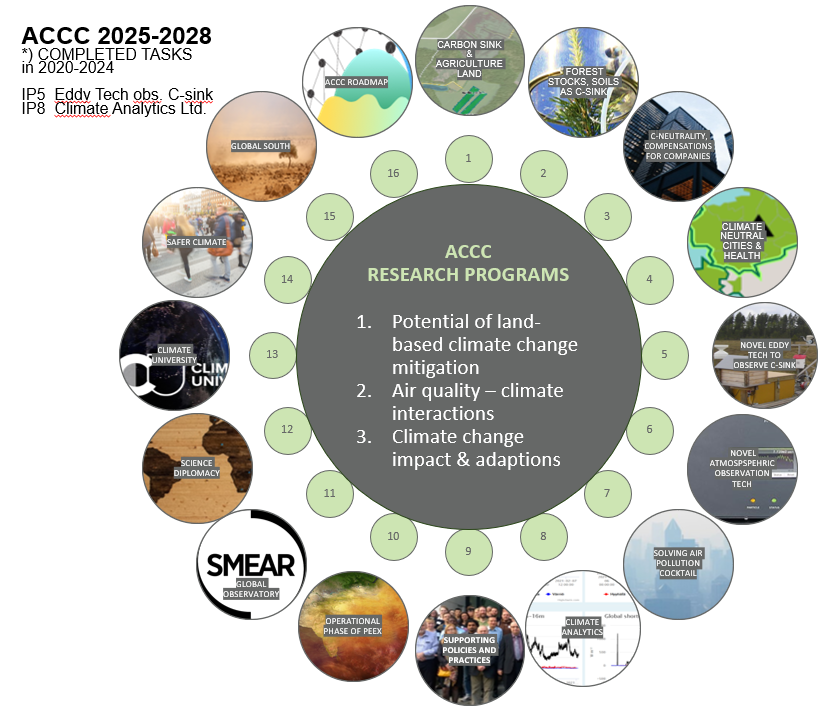The ACCC consortium brings together the top-level science of the ACCC partners (UH, FMI, UEF, TAU) and the needs and expertise of +40 key stakeholders to co-create the knowledge-based solutions needed to achieve climate neutrality in Finland, and as a front-runner for global climate neutrality.
The ACCC coordinates its work via 3 Research Programs and 13 Impact Tasks that will maximize the interaction between the research communities, businesses, policy and societal sectors.
– Objectives of the ACCC Flagship –
- To provide beyond state-of-the-art scientific knowledge on two of the most urgent global Grand Challenges: climate change and deteriorating air quality.
- To establish a platform (ACCC Service Portal) to collect big data from comprehensive observations and multi-scale models to be delivered to various stakeholders.
ACCC Research Programs
The ACCC Research Programs serve as the framework for ACCC collaborations with multistakeholder partners to deliver knoweldge-based actions and solutions through its Impact Tasks (Fig. 1).
Research Program 1 – Quantifying and activating the potential of land-based climate change mitigation
Research Program 2 – Quantifying the air quality – climate interactions and their impacts
Research Program 3 – Climate change impacts and adaptation
Research Program 1- Quantifying and Activating the Potential of Land-based Climate Change Mitigation isworking toimproved estimates and verification of greenhouse gas (GHG) sources and sinks in terrestrial ecosystems and their feedbacks to radiative budget. Climate impacts of land use, land use changes and forestry will be quantified, which account for GHG balances, albedo effects, aerosol-cloud-climate and water cycle effects, and feedbacks to ecosystems. This will lead to development of agricultural practices optimizing soil carbon sequestration, as well as stand-level forest management that simultaneously optimize the value of carbon storage, biodiversity, and the economic value of forest production. Boreal and Arctic regions are focus areas, including the quantification of feedbacks and impacts on its societies and economies. This includes improving prediction of e.g. extreme weather events, insect and wildfire outbreaks.
Research Programme 2– Quantifying the Air Quality – Climate Interactions and their Impacts studies the origins and impacts of air pollution with diverse approaches and from different perspectives. Research is focused on primary particle and gaseous emissions and secondary production of air pollutants, conducting laboratory and field experiments of emissions, their atmospheric transformation and transportation, and to tie these together with multi-level modelling, from process and emission models to detailed transport models and global Earth system models. Additonally, R2 develops instruments and model frameworks to improve the capabilities to investigate all these aspects. The main goals are to understand the constituents of deteriorated air quality, discover the ways to improve it, and estimate the influence of anthropogenic pollutant emissions on the global climate and environment.
Research Program 3 – Climate Change Impacts and Adaptation focuses on studying how climate change affects societies and how societies can adapt to climate change. The research topics include for example improving predictions of extreme weather events and vegetation changes, climate risk analyses, quantification of key ecological, social and economic impacts of land-use changes, and mapping the adequacy of existing legal frameworks for meeting Paris Agreement targets and developing recommendations for new climate policies.

Some examples of ACCC Impact projects include the verification of carbon sinks and emissions with the Verified Climate Safety initiative, assessing air quality and climate impacts through research with the ACCC Service Portal, educating the future change makers at the Climate University, and hosting Science Diplomacy and Society Forums.
For more information visit our Collaborations page.